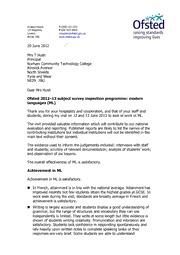
Norham High School Inspection 12 June 2012 PDF
Preview Norham High School Inspection 12 June 2012
Aviation House T 0300 123 1231 125 Kingsway F 020 7421 6855 London [email protected] WC2B 6SE www.ofsted.gov.uk 20 June 2012 Mrs T Hush Principal Norham Community Technology College Alnwick Avenue North Shields Tyne and Wear NE29 7BU Dear Mrs Hush P rincipal Ofsted 2012–13 subject survey inspection programme: modern languages (ML) Thank you for your hospitality and cooperation, and that of your staff and students, during my visit on 12 and 13 June 2012 to look at work in ML. The visit provided valuable information which will contribute to our national evaluation and reporting. Published reports are likely to list the names of the contributing institutions but individual institutions will not be identified in the main text without their consent. The evidence used to inform the judgements included: interviews with staff and students; scrutiny of relevant documentation; analysis of students’ work; and observation of six lessons. The overall effectiveness of ML is satisfactory. Achievement in ML Achievement in ML is satisfactory. In French, attainment is in line with the national average. Attainment has improved recently but few students attain the highest grades at GCSE. In work seen during the visit, standards are broadly average in French and achievement is satisfactory. Writing is largely accurate and students display a good understanding of grammar, but the range of structures and vocabulary they can use independently is limited. They write at some length but little evidence is shown of students writing creatively. Pronunciation and intonation are satisfactory. Students lack confidence in responding spontaneously and rely heavily upon written notes to complete speaking tasks or their responses are very brief. Some students are able to understand information from a variety of texts and from extracts of speech but many have difficulty doing this without support. Students have a very clear understanding of the importance of learning a language and have very positive attitudes towards learning languages. They say they would like more opportunity to use the language creatively in lessons. Quality of teaching in languages The quality of teaching in languages is satisfactory. The teachers’ command of the language is good. Students benefit from good role models. However, the language being learned is not always used effectively in lessons. As a result, students’ listening and speaking skills are not as well developed as they might be. Students use text well to increase their range of vocabulary and structures. However, opportunities are missed to develop their reading skills by, for instance, requiring students to identify key vocabulary and phrases in texts or to demonstrate to others how they have arrived at their answers. As a result, some struggle to identify the main points and detail from extended texts. Opportunities are missed to reinforce and support students’ learning through display. The over-reliance on worksheets and word lists restricts students’ progress and inhibits rather than increases students’ independence in communicating their ideas. Opportunities are missed to enable students to practise new language and use the language themselves for real purposes, to give and gather information. Assessment information is used effectively to plan for the progress of groups of differing ability. Marking is regular, but is not sufficiently linked to the assessment criteria to enable students to understand precisely how they can improve their work. Quality of the curriculum in ML The quality of the curriculum in ML is satisfactory. All students study French from Year 7. Progress is slowed for students in Year 7 who only have one lesson per week. Information and communication technology (ICT) is used effectively to present new language and, through the learning platform, all students are able to gain access to resources and materials to support and extend their learning further. An annual trip to Paris is popular with students. Links with local universities, including master classes, and visits by theatre groups enrich students’ experience. Older students help younger children in primary feeder schools with their language learning and help with the European Day of Languages Schemes of work ensure continuity and progression and are currently being reviewed. The school takes full account of students’ previous experience of learning languages and the recently planned curriculum in the primary schools and Year 7 allows for continuity and progression. Although this is at the early stages of development, students are building effectively on their previous experience of learning French. Students are well informed about the choices they make at the end of Key Stage 3 but say they would like to be better informed about next steps in languages post 16. Effectiveness of leadership and management in ML The effectiveness of leadership and management in ML is satisfactory. The head teacher and the school’s senior leadership team provide very strong support for modern languages and have a clear commitment to enabling as many students as possible to continue their study of a language through Key Stage 4 and beyond. The department’s evaluation of its performance is satisfactory. Priorities for further development are identified and students’ progress tracked closely. Monitoring and evaluation of the department’s performance by the senior leadership team are thorough, accurate and focused on raising standards. Currently more than a third of students in Year 10 study French, which is a significant improvement on previous years. Areas for improvement, which we discussed, include: increasing students’ confidence and independence in using the language being learned by: providing more opportunities for students to use the language for real purposes decreasing students’ dependence upon written notes and prompts improving students’ listening and speaking skills by increasing the use of the language being learned in lessons. I hope that these observations are useful as you continue to develop ML in the school. As explained previously, a copy of this letter will be published on the Ofsted website. It may be used to inform decisions about any future inspection. A copy of this letter is also being sent to your local authority. Yours sincerely Judith Tolley Additional Inspector
